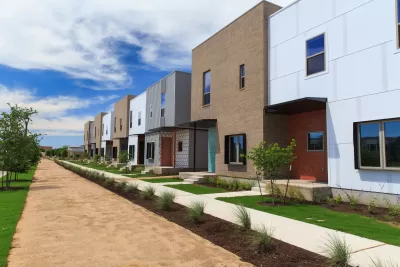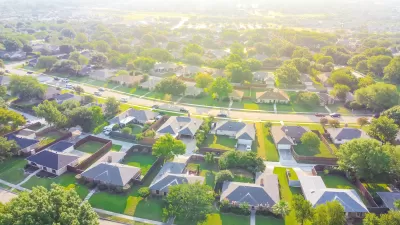The study highlights high real estate costs as well as restrictive zoning regulations and building requirements that delay multi-family construction.

New studies from the University of Texas commissioned by the city of Austin reveal the causes of high housing construction costs in the city and propose solutions for reducing them, reports Ben Thompson in Community Impact.
“Among analysts' top findings were Austin's standout costs compared to other cities, as well as the competitive local cost of multifamily versus single-family development and the elevated price tag of construction on the west side,” Thompson adds.
With the cost of land and construction materials and labor rising, city regulations that add extra costs are more likely to make or break a project, according to the study. “Although the city has sought to speed up those processes for years, builders are still experiencing the effects of a slower system that can end up passing costs along to residents.”
Researchers also found that multi-family housing is the cheapest to build, but faces the most obstacles from local building regulations and zoning codes.
Recommendations for making housing construction faster and more affordable include: implementing zoning reforms that permits more housing types, reducing labor costs through workforce training, limiting regulatory constraints such as parking requirements, and improving incentive programs for affordable housing developers.

Planetizen Federal Action Tracker
A weekly monitor of how Trump’s orders and actions are impacting planners and planning in America.

Congressman Proposes Bill to Rename DC Metro “Trump Train”
The Make Autorail Great Again Act would withhold federal funding to the system until the Washington Metropolitan Area Transit Authority (WMATA), rebrands as the Washington Metropolitan Authority for Greater Access (WMAGA).

The Simple Legislative Tool Transforming Vacant Downtowns
In California, Michigan and Georgia, an easy win is bringing dollars — and delight — back to city centers.

The States Losing Rural Delivery Rooms at an Alarming Pace
In some states, as few as 9% of rural hospitals still deliver babies. As a result, rising pre-term births, no adequate pre-term care and harrowing close calls are a growing reality.

The Small South Asian Republic Going all in on EVs
Thanks to one simple policy change less than five years ago, 65% of new cars in this Himalayan country are now electric.

DC Backpedals on Bike Lane Protection, Swaps Barriers for Paint
Citing aesthetic concerns, the city is removing the concrete barriers and flexposts that once separated Arizona Avenue cyclists from motor vehicles.
Urban Design for Planners 1: Software Tools
This six-course series explores essential urban design concepts using open source software and equips planners with the tools they need to participate fully in the urban design process.
Planning for Universal Design
Learn the tools for implementing Universal Design in planning regulations.
Smith Gee Studio
City of Charlotte
City of Camden Redevelopment Agency
City of Astoria
Transportation Research & Education Center (TREC) at Portland State University
US High Speed Rail Association
City of Camden Redevelopment Agency
Municipality of Princeton (NJ)





























